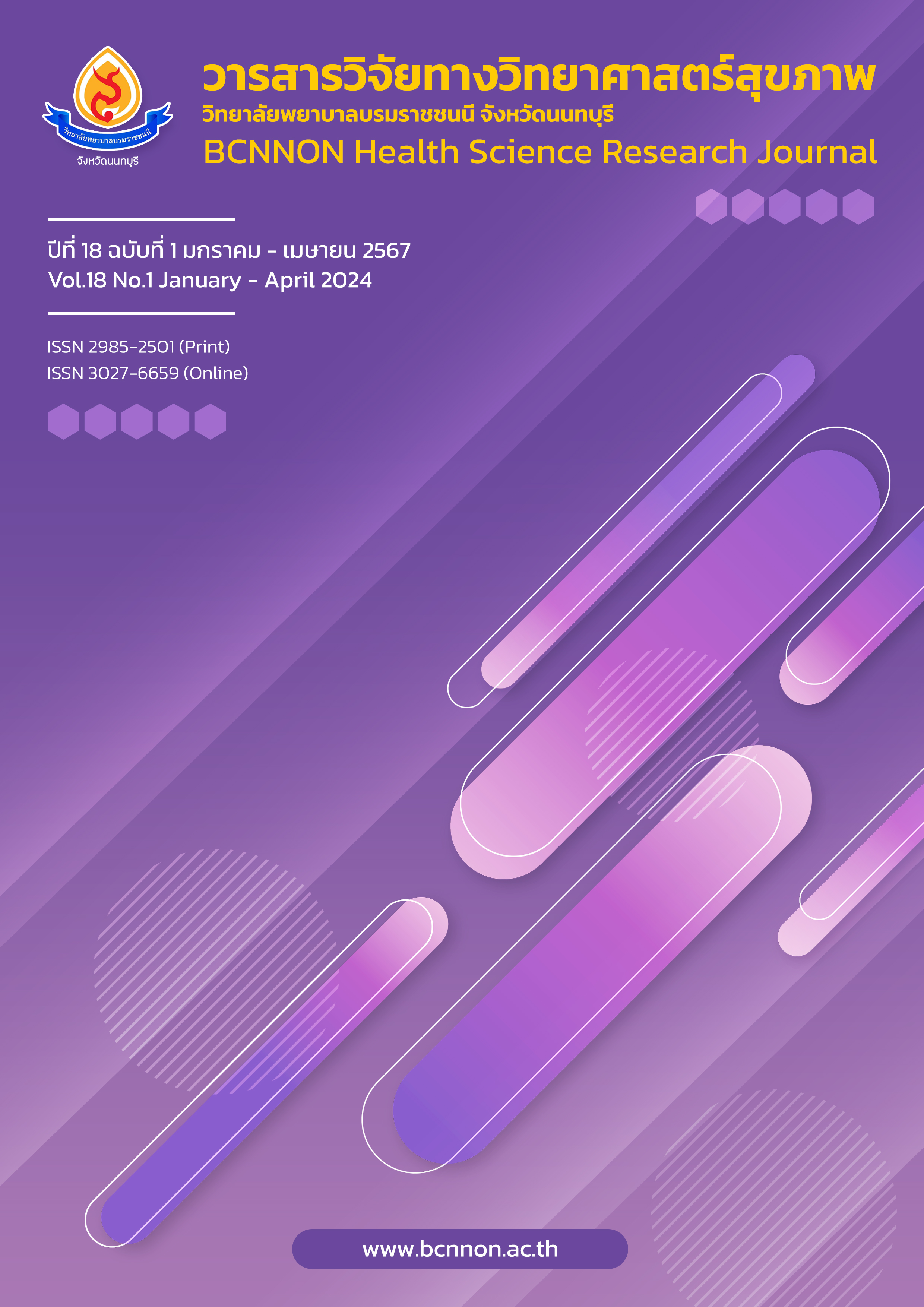ผลของโปรแกรมการส่งเสริมพัฒนาการของเด็กปฐมวัยด้วยการละเล่นแบบไทยต่อพัฒนาการของเด็กปฐมวัย
Main Article Content
บทคัดย่อ
บทนำ : โปรแกรมการส่งเสริมพัฒนาการ เป็นสิ่งสำคัญอย่างยิ่งในการช่วยกระตุ้นให้เด็กมีพัฒนาการที่สมวัย ทั้งด้านการเคลื่อนไหว สังคมอารมณ์ และสติปัญญา โดยเฉพาะอย่างยิ่งโปรแกรมที่มีการนำการละเล่นแบบไทยมาช่วยจัดกิจกรรมการเล่น เพื่อส่งเสริมพัฒนาการของกลุ่มเด็กปฐมวัย
วัตถุประสงค์การวิจัย : เพื่อศึกษาผลของโปรแกรมการส่งเสริมพัฒนาการเด็กปฐมวัยด้วยการละเล่นแบบไทยต่อพัฒนาการของเด็กปฐมวัย
วิธีการวิจัย : การศึกษาครั้งนี้เป็นวิจัยกึ่งทดลอง แบบสองกลุ่ม ทดสอบก่อนและหลัง ตัวอย่างเป็นเด็กอายุ 2-4 ปี ที่ได้รับการประเมินพัฒนาการด้วยเครื่องมือประเมินพัฒนาการ DSPM และไม่ผ่านเกณฑ์อย่างน้อย 1 ข้อ แบ่งเป็นกลุ่มทดลองและกลุ่มเปรียบเทียบ กลุ่มละ 30 คน กลุ่มทดลองจะได้รับโปรแกรมการส่งเสริมพัฒนาการด้วยการละเล่นแบบไทยเป็นระยะเวลา 4 สัปดาห์ เครื่องมือวิจัยประกอบด้วย 1) โปรแกรมการส่งเสริมพัฒนาการเด็กปฐมวัยด้วยการละเล่นแบบไทย 2) คู่มือเฝ้าระวังและส่งเสริมพัฒนาการเด็กปฐมวัย (DSPM) 3) วิดีโอการส่งเสริมพัฒนาการเด็กด้วยการละเล่นแบบไทย 4) คู่มือการส่งเสริมพัฒนการเด็กด้วยการละเล่นแบบไทยสำหรับผู้ปกครอง วิเคราะห์ข้อมูลด้วยสถิติเชิงพรรณนา และไคสแควร์
ผลการวิจัย : กลุ่มทดลองมีพัฒนาการรายด้านเพิ่มขึ้นทุกด้าน แต่กลุ่มเปรียบเทียบ มีพัฒนาการเพิ่มขึ้นเฉพาะด้านกล้ามเนื้อมัดใหญ่ ด้านกล้ามเนื้อมัดเล็กและสติปัญญา และด้านการรับรู้ทางภาษาเท่านั้น โดยผลการเปรียบเทียบความแตกต่างของพัฒนาการรายด้าน ก่อนและหลังการทดลอง พบว่า พัฒนาการด้านการช่วยเหลือตนเองและสังคมของกลุ่มทดลอง ดีขึ้นมากกว่า กลุ่มเปรียบเทียบอย่างมีนัยสำคัญทางสถิติ ที่ระดับ .05
สรุปผล : โปรแกรมการส่งเสริมพัฒนาการเด็กปฐมวัยด้วยการละเล่นแบบไทย สามารถช่วยส่งเสริมพัฒนาการเด็กปฐมวัยให้ดีขึ้นได้
Downloads
Article Details

อนุญาตภายใต้เงื่อนไข Creative Commons Attribution-NonCommercial-NoDerivatives 4.0 International License.
บทความที่ได้รับการตีพิมพ์เป็นลิขสิทธิ์ของวิทยาลัยพยาบาลบรมราชชนนี จังหวัดนนทบุรี
ข้อความที่ปรากฏในบทความแต่ละเรื่องในวารสารวิชาการเล่มนี้เป็นความคิดเห็นส่วนตัวของผู้เขียนแต่ละท่านไม่เกี่ยวข้องกับวิทยาลัยพยาบาลบรมราชชนนี จังหวัดนนทบุรี และคณาจารย์ท่านอื่น ในวิทยาลัยฯ แต่อย่างใด ความรับผิดชอบองค์ประกอบทั้งหมดของบทความแต่ละเรื่องเป็นของผู้เขียนแต่ละท่าน หากมีความผิดพลาดใด ๆ ผู้เขียนแต่ละท่านจะรับผิดชอบบทความของตนเองแต่ผู้เดียว
เอกสารอ้างอิง
The National Institute of Child Development, Department of Health, Ministry of Public Health. Review and analysis of data on the national early childhood development situation. Nonthaburi: The National Institute of Child Development; 2022. (in Thai).
Health Data Center, Pathumtani Provincial Public Health Office. Percentage of the population aged 35 years and over who were screened for diabetes mellitus Sakon Nakhon province. [internet]. 2022 [cited 2022 Nov 16]; Available from: https://pte.hdc. moph.go.th/hdc/reports/report.php?cat_id=1ed90bc32310b503b7ca9b32af425ae5&id=2238b7879f442749bd1804032119e824. (in Thai).
Ministry of Public Health. Developmental Surveillance and Promotion Manual (DSPM). Nonthaburi: Office of Printing Affairs of the War Veterans Organization 2019. (in Thai).
Suntra N. Summary of results of early childhood development operations for the year 2020. [internet]. 2022 [cited 2022 Nov 16]; Available from: https://nich.anamai.moph.go.th/ th/general-of-50/download/?did=193861&id= 46060&reload=. (in Thai).
Phulom N, Watchasin J, Chaiyamongkol N. Family ecology: factors influencing toddler development. The Journal of Boromarajonani College of Nursing, Nakhonratchasima. 2016;22(1):18-36. (in Thai).
Office of the Secretariat of the Education Council, Ministry of Education. The role of parents, mentors, and child caretakers in raising and developing early childhood children. [internet]. 2022 [cited 2022 Nov 16]; Available from: https://preschool.or.th/content/ documents/1232-file.pdf. (in Thai).
The National Institute of Child Development, Department of Health, Ministry of Public Health. Review of Thai child development status 2021. [internet]. 2022 [cited 2022 Nov 16]; Available from: https://nich.anamai.moph.go.th/ th/general-of-50/download/?did=204370&id =71944&reload=. (in Thai).
Cholchai W. Electronic media through screens and development and learning. In: Cholchai W, editor. Effects of electronic media through screens on children and adolescents. Bangkok: Beyond Enterprise; 2018. (in Thai).
Tipmanosing D. Factors affecting early childhood development of children at the Bangkok Child Development Centers. Journal of Charoenkrung Pracharak Hospital. 2022;18(1):51-68. (in Thai).
Thongluang P. The effects of self-efficacy development program on promoting early childhood development. [Thesis]. Phitsanulok: Naresuan University; 2016. (in Thai).
Lewin K. Frontiers in group dynamics: concept, method and reality in social science; social equilibria and social change. Hum Relat. 1947;1(1):5-41. doi: 10.1177/00187267 4700100103.
Kongdoung P. Effects of sensory motor activities on early childhood development [Thesis]. Chiangmai: Chiangmai University; 2017. (in Thai).
Cohen J. Statistical power analysis for the behavioral sciences. 2nd ed. New Jersey: Lawrence Erlbaum Associates; 1988.
Sirithongthaworn S. The development of developmental surveillance and promotion manual; DSPM. Journal of the Psychiatric Association of Thailand. 2018;63(1):3-12. (in Thai).
Klinkasorn S. Thai games. Bangkok: Chulalongkorn University Press; 2016. (in Thai).
Madteh F. The effect of practicing folk games on the development of early childhood children [Thesis]. Songkhla: Prince of
Songkla University; 2014. (in Thai).
Paso P, Chuwet P. The effects of Isan recreational folk game program on youths’ physical fitness and stress level. Journal of SaengKhomKham Buddhist Studies. 2022;7(1):47-64. (in Thai).
Srituravanich C, Somboon P, Sukkasem Y. The effectiveness of developmental programs for children aged 3-5 years. [internet]. 2019 [cited 2022 Nov 16]; Available from: https://oec. anamai.moph.go.th/th/more-news-php-cid-108-filename-index/download/?did=200518 &id=60444&reload=. (in Thai).
Baradaran Bazaz S, Yaghobi Hasankala Q, Shojaee AA, Unesi Z. The effects of traditional games on preschool children’s social development and emotional intelligence: a two - group, pretest - posttest, randomized, controlled trial. Modern Care Journal. 2018; 15(1):e66605. doi: 10.5812/MODERNC.66605.
Somsri T, Haenjohn J, Supwirapakorn W. A development of inhibitory control based on Thai traditional game training program in elementary school students. Journal of The Royal Thai Army Nurses. 2020; 21(2):222-30. (in Thai).
Niltawee J, Chaleekhrua S. Developing social behavior of pre-school children by using Thai folk plays. Sikkha Journal of Education. 2021;8(1):57-66. (in Thai).


